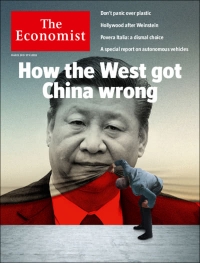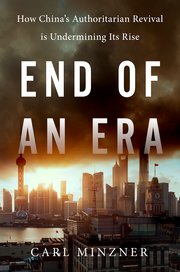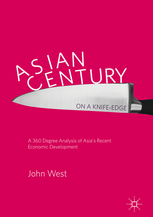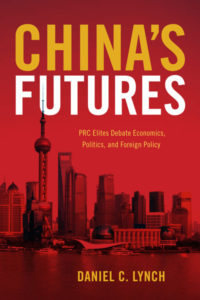 Measures announced last month to strengthen the leadership role of the Chinese Communist Party and remove term limits for President Xi Jinping have raised fears about the increasingly authoritarian trajectory of Chinese politics, says Timothy R. Heath, a senior defense and international researcher at the non-profit, non-partisan RAND Corporation.
Measures announced last month to strengthen the leadership role of the Chinese Communist Party and remove term limits for President Xi Jinping have raised fears about the increasingly authoritarian trajectory of Chinese politics, says Timothy R. Heath, a senior defense and international researcher at the non-profit, non-partisan RAND Corporation.
However, given the country’s immense economic and governance challenges and the realities of a political system characterized by a weak civil society, fragile political institutions and Communist Party leadership, the authorities have little realistic alternative than to rely on the Communist Party’s leadership to oversee difficult structural changes, he writes for World Politics Review.
Some see Xi as the first leader of a new era of strongman rule, in which there are few constraints on the top leader, notes Jeffrey Wasserstrom of the University of California, Irvine:
 In addition, there are now centers on Chinese campuses devoted to the study of “Xi Jinping Thought.” His name has been added to China’s Constitution. No living figure has gotten this treatment since the most famous Chinese Communist Party leader of all: Mao Zedong. …Legal scholar Carl Minzner has titled his new book “The End of an Era: How China’s Authoritarian Revival Is Undermining Its Rise.”
In addition, there are now centers on Chinese campuses devoted to the study of “Xi Jinping Thought.” His name has been added to China’s Constitution. No living figure has gotten this treatment since the most famous Chinese Communist Party leader of all: Mao Zedong. …Legal scholar Carl Minzner has titled his new book “The End of an Era: How China’s Authoritarian Revival Is Undermining Its Rise.”
In tandem with this emphasis on Xi differing from his immediate predecessors, many foreign commentators argue that he is less like Hu and Deng than he is like Mao, Wasserstrom adds.
![]() In the latest manifestation of China’s sharp power, an internal directive from the ruling Communist Party recently authorized an aggressive program of stealing U.S. science and technology information, to be carried out by its United Front Work Department, the Washington Beacon reports:
In the latest manifestation of China’s sharp power, an internal directive from the ruling Communist Party recently authorized an aggressive program of stealing U.S. science and technology information, to be carried out by its United Front Work Department, the Washington Beacon reports:
United Front work is a communist euphemism for strategic alliances among groups and affiliates that dates to the Soviet Union under Lenin. Chinese supreme leader Xi Jinping greatly increased the use of united front work as a key tool in China’s global influence operations. Xi stated in a September 2014 speech that united front work is among the Party’s “magic weapons” in low-level global warfare against enemies, including the United States. …..A copy of the three-page Party report was obtained by the Washington Free Beacon from a person with ties to the Chinese intelligence and security communities. An English translation can be found here.
 Beijing is actively undermining Western democracy by aggressively promoting the China Model through what a recent National Endowment for Democracy report calls sharp power, observers suggest.
Beijing is actively undermining Western democracy by aggressively promoting the China Model through what a recent National Endowment for Democracy report calls sharp power, observers suggest.
But China’s foreign influence activities simply reflect the view that “political uniformity is not only impossible but also undesirable,” according to a pro-regime analyst.
The West “must realize that liberal democracy — particularly of the American style — was the product of the right set of factors at the right time and the right place,” argues Xie Tao, professor of political science at Beijing Foreign Studies University. “As such it is hardly replicable in the rest of the world, either by emulation or by coercion,” he writes for the Diplomat:
 More important, U.S. democracy is in serious political decay, characterized by appalling inefficiency, growing inequality, and widespread discontent. When popularly elected politicians fail to govern effectively, voters will naturally turn to leaders who can do so, even if these leaders have strong populist and authoritarian tendencies that are anathema to liberal democracy.
More important, U.S. democracy is in serious political decay, characterized by appalling inefficiency, growing inequality, and widespread discontent. When popularly elected politicians fail to govern effectively, voters will naturally turn to leaders who can do so, even if these leaders have strong populist and authoritarian tendencies that are anathema to liberal democracy.
Beginning in the 1980s, Americans and Europeans made a number of lazy assumptions about how economic engagement with China would inevitably lead to social and political change, argues Kerry Brown, Professor of Chinese Studies at King’s College, London.
“Even the most cursory attention to China’s imperial and modern histories would show that it was unlikely to conform neatly to such a simplistic approach,” he writes to the Economist:
After all, China has form as a disrupter. It took Marxism-Leninism from the Soviets and completely changed it to a template that suited itself. The West in the 1980s might have asked the Soviet Union how its engagement with China went. That would have spared a lot of wasted effort…..As Sun Tzu pointed out 2,500 years ago, going into a battle where you don’t even know yourself is a near certain recipe for defeat.
 China’s foreign influence is reportedly expanding at the expense of the U.S but the apparent waning of America’s geopolitical predominance in Asia may not be permanent, says analyst John West, the author of the recently published “Asian Century ….on a Knife edge”:
China’s foreign influence is reportedly expanding at the expense of the U.S but the apparent waning of America’s geopolitical predominance in Asia may not be permanent, says analyst John West, the author of the recently published “Asian Century ….on a Knife edge”:
China is not a promoter of open markets, good governance, and international rule of law, key elements for realizing an Asian century. Rather, state capitalism, authoritarian governance, and Sinocentric bilateralism are China’s currency. …. It is important to recall that America has seemed to be in inexorable decline in the past, only to rebound spectacularly—such as following the Vietnam War, and after economic and technological challenge from Japan in the 1980s. America’s economy and political system have often demonstrated amazing resilience.
“China itself is beset with a host of challenges: its massive debt, demographic decline, and weak productivity growth,” he writes for the Asian Sentinel. “And it is far from clear that its renewed authoritarian model under Xi will take the country in a positive direction.”
 Skeptics have pointed out that to date, only liberal, democratic nations have achieved the highest levels of prosperity, RAND analyst Heath adds:
Skeptics have pointed out that to date, only liberal, democratic nations have achieved the highest levels of prosperity, RAND analyst Heath adds:
There are still plenty of reasons to doubt whether a repressive political system is ultimately compatible with an economy premised on the contributions of a large, highly educated middle-class. But a better understanding of why China has adopted stronger Communist Party rule in pursuit of its ambitions can also help inform a more accurate assessment of the country’s prospects.
“Read this way, the turn to stronger single-party rule may be understood as a sign both of the leadership’s determination to realize its vision of national revitalization, and of the lack of other options,” he concludes.







